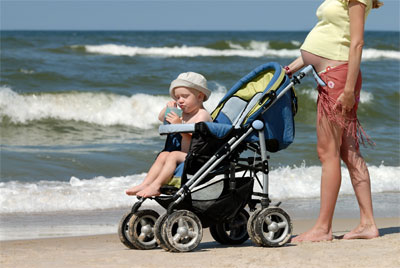
Many women travel for business or pleasure while pregnant. If you are generally in good health, have no known issues that may cause complications, and your doctor has approved your plans, there ís no reason why you shouldn’t take that trip.
When planning travel while pregnant, be conservative in judging your physical capabilities. If you haven’t biked or hiked before, now is not a good time to start. If you’re planning an adventurous trip, consider all that you might encounter. A backpack may be too heavy to carry when balancing a baby bump, a cramped bus or train can be nauseating, and you really do need your sleep for you and the baby.
Flying While Pregnant
Try to book an aisle seat to make the many potty breaks you’ll need a little easier. If possible, use frequent-flier miles to upgrade, so you can have additional legroom. Keep in mind, however, that pregnant women are not permitted to sit in emergency exit rows. Finally, since you are at greater risk for deep-vein thrombosis (DVT) while pregnant, wear support stockings and make the most of those walks to the bathroom on the plane.
Many airlines discourage (or outright prevent) travel by women during the final weeks of pregnancy. If you are heavily pregnant (in your third trimester or you’re pregnant with multiples), you may be asked for a medical certificate declaring that you have been examined by a doctor and are fit to travel. Check with your airline for specific rules and requirements, as policies vary from airline to airline, especially outside North America.
Timing Your Trip
Travel is easiest and safest during the middle trimester. During this time, you can usually do everything you would do if you weren’t pregnant, except maybe some riskier sports, such as scuba diving and downhill skiing. You may be more tired than usual, but that means you have an excuse to plan more lazy days to enjoy the company of your spouse, partner, or other children. And there are plenty of alternate activities that can make up for the things you canít do. For example, you can see almost as much marine life at a good snorkel spot as you would in full scuba gear.
Morning sickness and risk of miscarriage are highest in the first trimester. It’s likely you will be tired throughout your pregnancy, but you will be more weary in the last trimester. Risk of pre-term labor and other late-stage complications are highest in the last trimester.
Pregnancy, Travel, and Your Small Child
If you are pregnant and traveling with a young child, you’ll need to plan activities carefully. A pregnant mom and a jet-lagged preschooler do not mix well. Pregnancy (in addition to jet lag) makes you tired, but you cannot ignore the small child who depends on you to look after him. On the positive side, traveling with a small child forces you to take things more slowly, and that will probably suit you just fine.
Pregnancy, Diet and Travel
In addition to good prenatal care, the easiest way to ensure a healthy pregnancy is to eat healthy foods, including plenty of fruits and vegetables, get lots of exercise, and remember your multivitamins and folic acid supplements.
Bring enough prenatal vitamins with you for the whole trip. Your body has already become accustomed to that brand, and a different one may cause you to experience an upset stomach.
Medical and Health Issues
Complications in pregnancy are not predictable, but if a problem does occur, it may limit any travel plans you have. If you book a trip during the time you’ll be pregnant, purchase cancellation insurance.
Before departure, find out what your insurance offers for prenatal care, labor, delivery, and neonatal care while you’re away. It’s common for health insurance providers to limit coverage for labor and delivery away from your home area after thirty-seven weeks’ gestation.
Also consider the medical facilities where you’re going. If you are traveling in North America, this can be as simple as asking your doctor to recommend an obstetrician at your destination, so that you can have a number to call in case of an emergency. Abroad, consider in advance how to handle an emergency should it arise, if you are away from western-style medical facilities.
For a trip to a less-developed country, visit your prenatal-care provider before you leave to discuss any special measures you should take. Consult your provider well in advance, in case he makes suggestions that have an impact on your plans. See the website of the Centers for Disease Control and Prevention (CDC) (www.cdc.gov) to learn what shots are recommended and safe for pregnant women. Live viral vaccinations such as typhoid, measles, mumps, and rubella are not recommended if you are pregnant.
